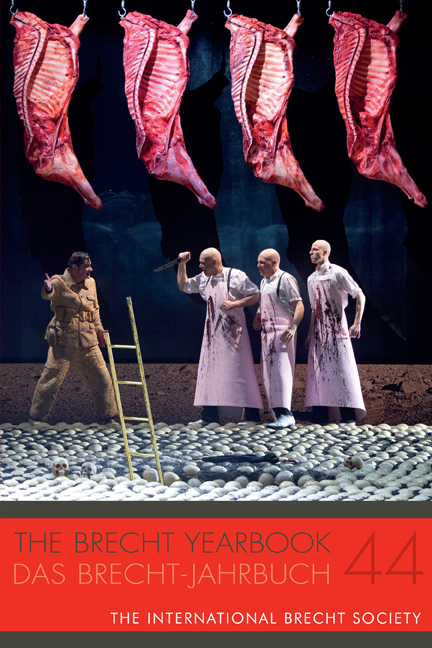Book contents
- Frontmatter
- Officers of the International Brecht Society
- Contents
- Editorial
- List of Abbreviations
- Brecht, Günter Kunert, and Edgar Lee Masters
- Brecht’s Dramatic Fragments
- Pure Joke: The Comedy of Theater since Brecht
- New Brecht Research
- Book Reviews
- Notes on the Contributors
- Now at De Gruyter Exilforschung Ein Internationales Jahrbuch
Introduction: Pure Joke
Published online by Cambridge University Press: 09 February 2021
- Frontmatter
- Officers of the International Brecht Society
- Contents
- Editorial
- List of Abbreviations
- Brecht, Günter Kunert, and Edgar Lee Masters
- Brecht’s Dramatic Fragments
- Pure Joke: The Comedy of Theater since Brecht
- New Brecht Research
- Book Reviews
- Notes on the Contributors
- Now at De Gruyter Exilforschung Ein Internationales Jahrbuch
Summary
This special section on comedy since Brecht argues that the rise of performativity and theatricality that we have experienced over the past century was largely enabled by what we might call a comic dispositif. This comic dispositif forged beyond the illusionistic dramatical and cultural forms of the eighteenth and nineteenth centuries and has greatly shaped the performative strategies of modern theater, such as dispensing with illusionistic representation, breaking with realistic role-playing, foregrounding various media instead of hiding them, playing with self-reflexivity, and calling on the diverse community within the theatrical space. It is astonishing how influential comedy has been and how it has nonetheless remained theoretically marginalized.
The papers in this section examine the function of comic devices in theater since Brecht. They explore theoretical and philosophical concepts of comedy, explore comedy's impact on contemporary theater, reflect on comic traditions (from Old Greek Comedy to commedia dell’arte and Romantic comedy), and show how these traditions continue to inform modern plays. In doing so, they not only examine theater in recent history but also investigate how the comic can tell us something about the aesthetical, philosophical, and political implications of theater today.
There have been very few theories of comedy that have not been, in one way or another, grounded in a theory of tragedy. Yet these theories moved beyond tragedy to develop influential concepts—like the concept of improvisation and “free play,” or the call to break down the fourth wall. Ludovico Riccoboni's history of commedia dell’arte, Justus Möser's defense of Harlequin, Adam Müller's lecture on Aristophanes, Friedrich Schlegel's concept of “beautiful joy” (“schöne Freude”), G. W. F. Hegel's “end of art” thesis, and Alenka Zupančič's contemporary philosophy of comedy are among the rare attempts to probe the essence of the comic on stage.
Things would obviously be different if Aristotle's book on comedy had not been lost. One can easily imagine that the poetics of drama would have developed quite differently if we had not had to rely quite so much on concepts such as mimesis and katharsis to describe dramatic texts and theater. The dominance of the tragic tradition is still noticeable in Walter Benjamin's The Origin of German Tragic Drama.
- Type
- Chapter
- Information
- The Brecht Yearbook / Das Brecht-Jahrbuch 44 , pp. 81 - 83Publisher: Boydell & BrewerPrint publication year: 2019

